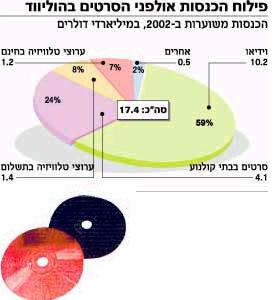The film studios, unlike the libraries, do not benefit from fines for delays; EZ-D DVD that will be marketed in the US from September is degraded by a chemical process

The new CD, before exposure (red) and after 48 hours
Los Angeles. "The movie is until Thursday midnight", is a familiar sentence to anyone who has rented a movie at a video library. The sellers do make sure to mention when to return the film before delivering the tape or DVD, but it turns out that the libraries actually don't care if the deadline fades from the customer's memory: when a film is returned late, the customers are fined an amount that sometimes doubles the rental price. The fines are of course not popular with the customers, but neither are the movie studios, who do not benefit from the fine money. To help customers bypass the fines - and especially in an attempt to find new ways to make money - Walt Disney is offering a new product: a biodegradable DVD CD.
As mentioned, fines for delays are a profitable component of the video libraries' income. According to estimates, this is more than 10% of the income from movie rentals. Yet,
The fines hardly affect the studios, whose profits come mainly from the sale of tapes and CDs to retail businesses. The home video unit of "Walt Disney" hopes that the new CD, EZ-D DVD, which will be marketed from September in kiosks and gas stations, will revolutionize this market.
The CD, which self-depletes after 48 hours, will be sold at the price of renting a movie in the US - $7-5. The CD will remain with the customer even at the end of the "rental" time (48 hours), but after this time he will not be able to continue watching the movie, because the CD will stop working. According to the British magazine "New Science", the period of time can be extended up to 60 hours after opening the wrapper.
The CD consists of a co-polymer of the "Lexan" type (a synthetic resin used to make various products, including CDs and glasses), a product of development by "General Electric". From the moment the disc is opened and exposed, the chemical clock in its structure begins to tick. The customer can watch the movie over and over again, but after 48 hours the color of the CD turns from red to black and the DVD player is no longer able to read it.
An attempt to bring a similar product to market failed in 1998, but EZ-D DVD proponents believe the current attempt will succeed, in part because DVDs are more common today. Disney also hopes that the price of the product will be close enough to the price of a one-time rental, and trust that customers will not be able to control the urge to buy a cheap, one-time product.
Disney intends to deviate from the norm and not sell the CDs in libraries; This way you can give up the middleman and maintain a high profit tension. At the same time, the company will try to ensure that product sales will not harm its profits from renting in libraries. The consumable CDs will hit the market only six weeks after the film arrives in libraries in regular format, and they will also not contain the extras that come with the film on the regular CD.
Many in Hollywood will follow with interest the attempt to sell the EZ-D DVD. The home video market accounts for about 59% of the American film industry's revenues, which according to Adams Media Research amount to about 17.4 billion dollars in the US. The chairman of Disney, Michael Eisner, sounded pessimistic a month ago: "I don't think it will work," he said, "I'm afraid it will come back to us like a boomerang, but we have to try."
Proponents of the biodegradable CD say that Eisner is too pessimistic, and that consumers will fall in love with the idea once they encounter the product. According to Robert Wright, president of the NBC broadcast network (owned by General Electric), a biodegradable CD is a product that cannot be refused: "If you want to go on vacation, you just buy five such CDs and shove them in your suitcase."
